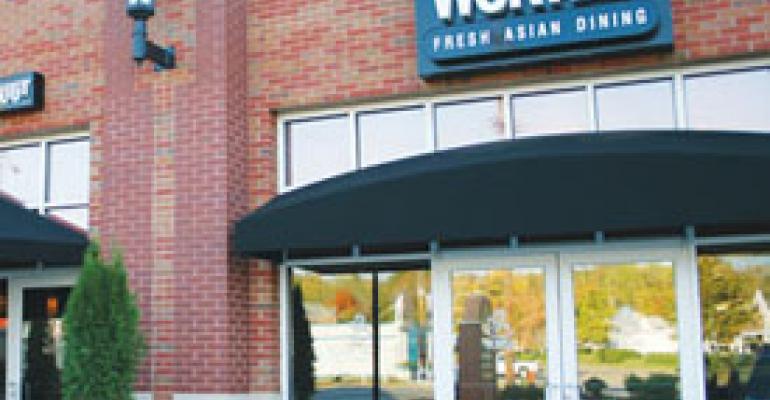Agrowing number of quick-service and fast-casual operators, looking to push guest counts up, are offering customers more opportunities to sit down.
Schlotzsky’s, Papa John’s Pizza, Ruby Tuesday’s formerly fast-casual Wok Hay concept and Sizzler are on the lengthening list of brands that have upgraded service at select units by either eliminating counter ordering or introducing meal delivery to tables. Operators say the relatively low-cost switch in service is a way to differentiate themselves from the competition, improve the guest experience and build on the perceptions of value they seek to offer.
“The customer is looking for a value right now and this just improves that value proposition for them,” said Kelly Roddy, president of the Schlotzsky’s sandwich chain, which is owned by Focus Brands Inc. Focus, the Atlanta-based franchisor of several quick-service brands, said earlier this month it is experimenting with table service in 35 branches of the 400-unit Schlotzsky’s chain, which is based in Austin, Texas.
About 20 company restaurants and 15 franchised stores primarily in Texas now deliver food to tables instead of having customers retrieve their food from the counter after their name or number is called, said Steve Romaniello, Focus’ president and chief executive.
The test has been underway for four months, although some franchisees started experimenting with table service close to nine months ago, Romaniello said. Research indicated that table service would be a way of distinguishing Schlotzsky’s from its competitors, he added. To maintain a sense of value for customers, there is no tipping.
Romaniello said he is pleased with the preliminary results. A decision about rolling the upgraded service chainwide is expected by the end of the year.
“Some managers have said the response has been so good that they feel some customers are coming in more frequently,” he said.
Roddy agreed, adding that so far the service has improved guest satisfaction and sales. It also offers employees immediate guest feedback and keeps dining rooms cleaner, he noted.
Romaniello said costs have not been affected significantly.
“We thought at first the incremental labor might be higher, but we recognized that our managers need to be out there anyway,” he said. “So we’ve been able to leverage those folks in a variety of ways without incurring meaningful additional costs. Over time, the higher-volume stores might cost a bit extra, but right now we are seeing no evidence of that.”
Maryville, Tenn.-based Ruby Tuesday Inc. recently scrapped the limited-service setup of the Asian fast-casual brand it bought last July. The lone Wok Hay unit, in Knoxville, Tenn., now offers table service, as will a second unit that the casual-dining company plans to develop, also in the Knoxville area.
Rick Johnson, a spokesman for Ruby Tuesday, said the company switched from counter to full service because it believes guests prefer being seated and served to standing in lines.
“The costs to convert to full service weren’t significant because the restaurant already employed food runners to deliver food to tables, though there are a few more servers than there were runners,” he said.
Culver City, Calif.-based Sizzler also is testing upgraded service at some units.
The 300-plus-unit chain has evolved away from its grill-buffet format in recent years. Newer restaurants have a casual-dining ambience but retain a counter-ordering system. In the past several months, however, two franchised restaurants in the Houston area have begun offering full service on a trial basis, while a Las Vegas unit also plans to begin testing full service.
Brad Ritter, a Sizzler spokesman, said the objective is to determine if guests in some markets prefer full service to paying first. “At this point, it’s too early to reach any conclusions,” he said.
Papa John’s Pizza franchisees Frank Carney and Terry Newman also have started offering table service at one of their restaurants in Wichita, Kan.
Carney, who founded Pizza Hut with his brother, Dan, in 1958 and later sold the company, recently received long-sought permission from Papa John’s corporate office in Louisville, Ky., to offer table service in the remodeled restaurant, which features a salad bar and a large dining area.
Neither Carney nor Newman could be reached for comment. Tish Muldoon, a spokeswoman for Papa John’s, which has 2,672 domestic units, stressed that the dine-in location is not part of a chainwide test.
In the past, operators that had considered new service formats abandoned them because they didn’t fit their brand image or culture.
In the mid-1980s, fast feeder Carl Karcher Enterprises, now an arm of CKE Restaurants Inc., parent of the Carl’s Jr. and Hardee’s burger brands, rolled out Char-broiler Dinner platters and table-service at its Carl’s Jr. outlets and spent nearly two years planning, testing and equipping units with dishwashers and other new gear. However, substantial drops in earnings prompted the company to phase out the service, which analysts at the time said had inadvertently confused customers.
In 2003 Outback Steakhouse Inc., now OSI Restaurant Partners LLC, said it would explore entering the fast-casual sector, but a year later abandoned the idea. The casual-dining giant explained that it saw the no-tipping format of fast-casual as a likely deterrent to motivating service-oriented employees, and it questioned return-on-investment prospects.

